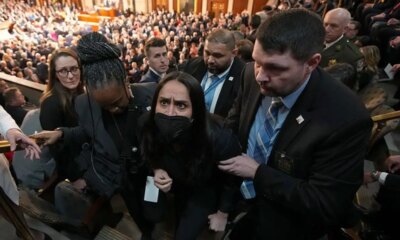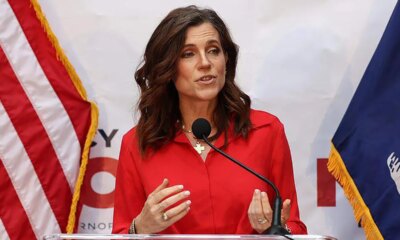World
Trump pulls security protections for Mike Pompeo, John Bolton

Hawkish foreign policy advisers from Trump’s first term as president have faced alleged assassination threats from Iran.
United States President Donald Trump has cancelled security protections for Mike Pompeo, Brian Hook and John Bolton, hawkish foreign policy advisers who served during his first term in office.
The New York Times broke the story on Thursday about Trump revoking protection for Pompeo, the former director of the Central Intelligence Agency (CIA).
According to anonymous sources familiar with the matter, Trump’s order took effect on Wednesday at 11pm Eastern Time (04:00 GMT, Thursday), stripping both Pompeo and Hook, a former top aide, of their security details.
That follows an earlier report that Trump did the same for Bolton, his former national security adviser. Bolton confirmed the news to CNN with a statement on Tuesday: “I am disappointed but not surprised.”
Trump has since defended that decision, calling Bolton a “very dumb person”.
“We’re not going to have security on people for the rest of their lives. Why should we?” Trump said.
But critics point out that Bolton, Pompeo and Hook have all faced alleged assassination threats from Iran.
The three leaders had taken a hardline stance against Iran throughout their foreign policy careers. Some analysts have speculated whether Trump’s decision to revoke their security details could be a form of retribution for perceived disloyalty.
One official from the administration of former President Joe Biden confirmed to The Associated Press, on condition of anonymity, that Trump’s team was well aware of the threats to the three men.
That person called Trump’s decision “highly irresponsible”.
Bolton had irked Trump with his public criticism after being ejected as national security adviser in 2019. He had served under previous Republican presidents including George W Bush and Ronald Reagan.
In his memoir, Bolton wrote harshly of Trump’s leadership. “A mountain of facts demonstrates that Trump is unfit to be president,” Bolton said.
Pompeo, meanwhile, has been less vocal in his criticisms, but he briefly flirted with a possible run in the 2024 presidential election, before low polling numbers sank his hopes. He went on to campaign on Trump’s behalf in 2024.
During Trump’s first term, from 2017 to 2021, Pompeo and Hook were architects of the US’s stance of “maximum pressure” towards Iran.
That period was marked by the US withdrawing from a detail to limit Iran’s pursuit of nuclear weapons in exchange for relief from devastating US sanctions.
It is unclear whether Trump will pursue a similar strategy during his second term.
But some experts have speculated that members of Trump’s inner circle have become more critical of the interventionist, assertive stance advocated by figures like Bolton and Pompeo.
Trump had said that Pompeo would play no role in his administration. This week, he also announced on social media that Hook had been fired from his presidentially appointed position at the Wilson Center, a think tank.
Dozens of former intelligence officials who had signed a letter in 2020 saying that the Hunter Biden laptop scandal had signs of a “Russian information operation” also had their security clearances revoked in recent days.

World
Video: ‘We Are Orphans’: Shiite Muslims Protest the Killing of Khamenei

new video loaded: ‘We Are Orphans’: Shiite Muslims Protest the Killing of Khamenei

By Nader Ibrahim and Malachy Browne
March 1, 2026
World
3 US service members killed, 5 seriously wounded in Iran operation

NEWYou can now listen to Fox News articles!
Three U.S. service members were killed and five others were seriously wounded as part of Operation Epic Fury, U.S. Central Command (CENTCOM) said Sunday morning.
In addition, several others sustained minor shrapnel injuries and concussions and are in the process of being returned to duty, CENTCOM announced.
“The situation is fluid, so out of respect for the families, we will withhold additional information, including the identities of our fallen warriors, until 24 hours after next of kin have been notified,” CENTCOM said.
Smoke rises over the city center after an Israeli army launches 2nd wave of airstrikes on Iran on Saturday. (Fatemeh Bahrami/Anadolu via Getty Images)
CLICK HERE TO DOWNLOAD THE FOX NEWS APP
This is a developing story. Please check back for updates.
World
At least nine killed after Iranian strike on Israel’s Beit Shemesh

BREAKINGBREAKING,
The Magen David Adom (MDA) emergency service says that 20 others were injured by the impact.
Published On 1 Mar 2026
At least nine people have been killed after an Iranian missile strike on the central Israeli city of Beit Shemesh, as Tehran continued to launch retaliatory attacks a day after Supreme Leader Ayatollah Ali Khamenei was killed in US-Israeli strikes.
The Magen David Adom (MDA) emergency service said on Sunday that nine people were killed and 20 other people were injured by the impact, including two in serious condition.
The Israeli military said in a statement that search and rescue teams, and a helicopter to evacuate those injured are currently operating in Beit Shemesh, with the army’s spokesperson adding that the circumstances of the impact from the Iranian ballistic missile are under review.
More to come …
-

 World4 days ago
World4 days agoExclusive: DeepSeek withholds latest AI model from US chipmakers including Nvidia, sources say
-

 Massachusetts4 days ago
Massachusetts4 days agoMother and daughter injured in Taunton house explosion
-

 Montana1 week ago
Montana1 week ago2026 MHSA Montana Wrestling State Championship Brackets And Results – FloWrestling
-

 Denver, CO4 days ago
Denver, CO4 days ago10 acres charred, 5 injured in Thornton grass fire, evacuation orders lifted
-

 Louisiana7 days ago
Louisiana7 days agoWildfire near Gum Swamp Road in Livingston Parish now under control; more than 200 acres burned
-

 Technology1 week ago
Technology1 week agoYouTube TV billing scam emails are hitting inboxes
-

 Technology1 week ago
Technology1 week agoStellantis is in a crisis of its own making
-

 Politics1 week ago
Politics1 week agoOpenAI didn’t contact police despite employees flagging mass shooter’s concerning chatbot interactions: REPORT






















